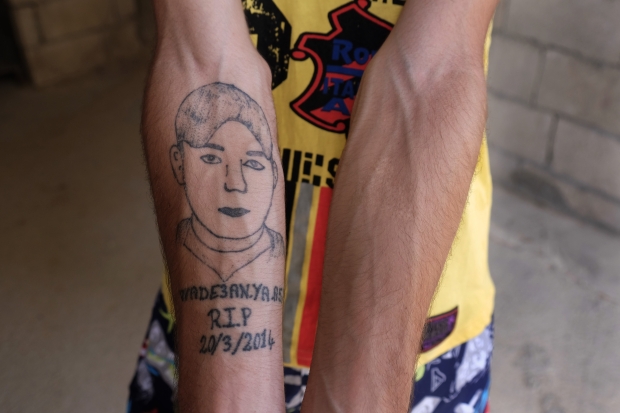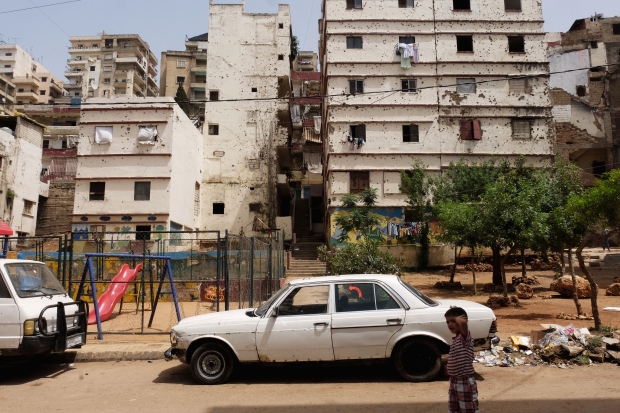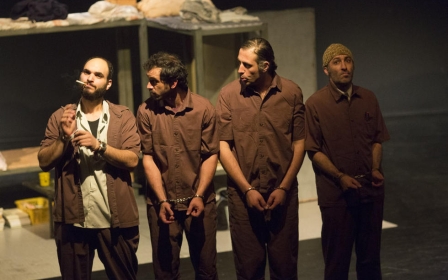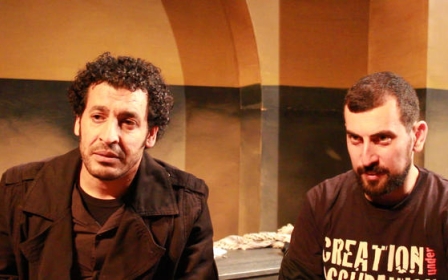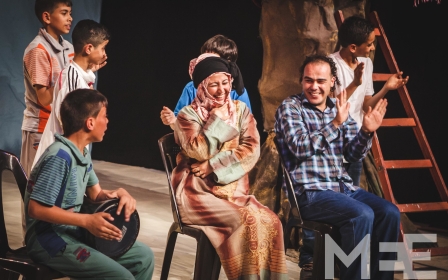A tale of two neighbourhoods in Lebanon's Tripoli
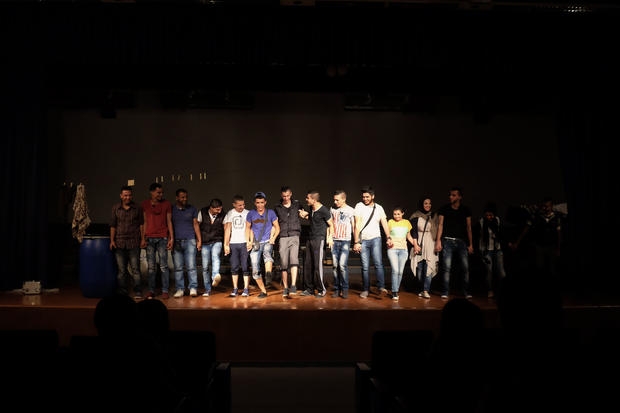
TRIPOLI, Lebanon - When he was about 15, Ali sold his motorbike to buy his first AK-47.
With his newly-acquired weapon, he joined Jabal Mohsen Alawite militias in their fight against the Sunni rivals from the neighbouring Bab al-Tabbaneh area.
Among his opponents, there was Samir, who took up arms when he was 17. Both of them were fighting for the same reasons: the will to protect their family and neighbourhood as well as mutual hatred.
They had many more things in common but they didn’t know that at the time: they both came from disadvantaged environments with poor infrastructures and services; they both dropped out of school early, and had no job opportunities waiting for them after that.
Now Ali is about 20 and Samir is 25. Throughout the last four years, the intensification of the clashes in the northern Lebanese city has run parallel to the escalation of the conflict in Syria.
But the last big bout of fighting in the area, that involved the army and Tabbaneh gunmen, took place past October. Since then, the situation has been quite calm. This has allowed Ali and Samir to share a common positive experience for the first time. They have been rehearsing, discussing, joking and finally acting on a stage together as participants of a theatre workshop organised by the Lebanese NGO, March.
A total of 16 youths – mostly former fighters who were chosen in equal numbers from the Bab al-Tabbaneh and Jabal Mohsen neighbourhoods - have taken part in the four-month course that created the play Love and War on the Rooftop. The budding theatre group has now had successful shows in Tripoli and Beirut, with organisers hopeful that the relationships build in recent months will continue to endure.
The story, written and directed by the Lebanese author Lucien Bourjeily, was not unfamiliar to the group of youth despite being based on Shakespeare’s classic Romeo and Juliet. The adaptation focuses on a boy from Bab al-Tabbaneh who wants to stage his own free version of the text, which is set in Tripoli, and whose main characters are Ali and Aisha.
But the young director must face many difficulties with the actors, coming from the rival communities.
Difficult reconciliation
Barely 80 km north of Beirut, Tripoli is Lebanon’s second most populated city. Nevertheless, since the end of the civil war in 1990, the Lebanese government has been neglecting this Sunni-majority urban centre. Facing long-standing political conflicts, the authorities are unable to tackle the socio-economic gap and lack of infrastructure in the city, where 57 percent of the population lives in poverty, according to a recent study by the UN Economic and Social Commission for Western Asia (ESCWA). This percentage increases to 87 percent in Bab al-Tabbaneh and 69 percent in Jabal Mohsen.
One of the aims of this project was to bring these youths together to allow them to meet each other, deconstruct fears and hates, and build new friendships.
“When these young people shared their stories, they realised that they experienced the same problems,” explained Lea Baroudi, general coordinator of March.
Such problems are mirrored in the play, incredibly enriched by the experiences of the actors.
For instance, in one scene Ali, playing the role of Romeo, and Samir, in his role as Aisha’s brother, chat with other friends about how they had to lie about their origins when applying for a job and were subsequently fired when the employers discovered that they were from the Mohsen and Tabbaneh areas. (Stigmatisation is another consequence of the conflict, though only a very small portion of Tabbaneh-Mohsen inhabitants have participated in the clashes that periodically rock this part of Tripoli.)
“Initially, I didn't want to be part of this because I hated those people,” said Ali, who has three bullet scars in his body and some deeper wounds in his mind, especially the death of a friend killed by a sniper.
Finally, he decided to go on with the course. “After a few days, I realised they were not as bad as I thought,” he added.
As Bourjeily recalled: “There were very tense moments, when one more word could have ended the project.”
He explained that during the early sessions the youths sat separated according to their communities. In addition to the theatre classes, the group joined training sessions in communication and conflict resolution and received visits from VIPS including actress and directors, Nadine Labaki best known for the award-winning Lebanese movie Caramel, Lebanese actor and comedian George Khabbaz and veteran actor Rafic Ali Ahmad.
As the course progressed, the engagement of the youth with the project grew stronger, as did their friendship.
"These four months have also been a journey for them. Today they are different, they are more tolerant to other people’s ideas,” Bourjeily said.
Without this workshop, the paths of these youths may have hardly converged, despite the two districts being only one street apart.
The countless bullet holes filling the facades on both sides of the street testify to a long story of animosity, whose roots Ali and Samir barely know.
“Nobody never explained to me why the clashes started,” said Ali, who said he started fighting because he “read in social media that takfiris [fundamentalist Muslims] wanted to take Jabal Mohsen”.
Samir too was convinced he had no other option than fighting to defend Tabbaneh. But both of them remember the initial excitement when carrying a gun.
“I was always ready to die defending my neighbourhood,” said Samir, who just like Ali, now says he regrets his past.
According to Baroudi: “When you live in a place without a job, education or opportunities, you can be easily manipulated.”
This point of view is shared by Hafiza, 17, one of the three girls participating in the course.
“I'm not usually allowed to speak out concerning the fighting but I think it is useless. The politicians benefit from the lack of incomes in Tabbaneh and Mohsen. They keep them poor and they make them fight,” she said.
Abandoned by the state, many inhabitants of these areas depend on their local leaders to obtain assistance, jobs and services.
Despite the fact that during the past few years it “has often been portrayed as sectarian spillover from the Syrian crisis... the conflict between Jabal Mohsen and Bab al-Tabbaneh is in its essence political,” said Raphael Lefevre, researcher at the Carnegie Middle East Centre.
The origin of the conflict dates back to the Syrian occupation of the country during the Lebanese civil war (1975-1990). Tensions increased again after the withdrawal of Syrian troops from Lebanon in 2005 and exploded violently in 2008 and especially in 2011, at the start of the Syrian civil war.
While the predominantly Sunni population of Bab al-Tabbaneh supports the largely Sunni opposition groups, Jabal Mohsen population is mainly Alawite, the same sect as Syrian President Bashar al-Assad, and sympathises with his government. During the past four years, almost 20 different clashes have broken out in the area.
Space of freedom
During the last rehearsal before the premiere in Tripoli, the actors made jokes with each other and constantly interrupted the scenes by bursting into laughter.
“They have totally different opinions on politics, security, on how to live - but they all agree on one thing: they all like to have fun and make jokes. I feel that's one of the major elements that brings them together,” said Bourjeily.
“Keeping guys on stage, working and creating together, it’s like sending a strong message to everybody benefiting from the conflict, the divisions and the sectarianism in Lebanon and Syria. They are oppressed and through this play, they can protest against this overwhelming reality that holds them in a trap,” he added.
At the premiere of the play in Tripoli, the theatre was full. People came from Tabbaneh, from Mohsen as well as from the rest of the city. The audience laughed and clapped at every gag.
“At the beginning, my relatives were not happy about the idea but they got used to it," Hafiza said.
Other actors were threatened by members of their own communities because they appeared on TV talking about their new friendships but when the big day came, Hafiza’s parents were among the audience. Divisions were kept outside.
“This project will not solve the problem, but shows that these youth can become friends and that solutions are at hand,” Baroudi said, while stressing that she hoped the project would continue. If it does, there are hopes it will do so in a slightly less tense climate with large-scale violence at present being kept at bay.
“A security plan [implemented in April 2014] culminated in the arrest of most militia leaders who had been fighting in both neighbourhoods, so I don't see large-scale fighting likely to resume soon. However the plan did not address the root causes behind the tensions,” said Lefevre, although he says that as long as the root causes of conflict, like unemployment and discrimination remai, there is the risk of “further security incidents” happening.
Ali and Samir have no idea what the future will offer them, but they are willing to stay in their neighbourhoods. And they now say they have a real love of theatre.
"I like how I feel on stage,” said Ali.
Middle East Eye propose une couverture et une analyse indépendantes et incomparables du Moyen-Orient, de l’Afrique du Nord et d’autres régions du monde. Pour en savoir plus sur la reprise de ce contenu et les frais qui s’appliquent, veuillez remplir ce formulaire [en anglais]. Pour en savoir plus sur MEE, cliquez ici [en anglais].


